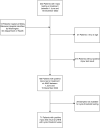Risk Factors for Hospitalization and Effect of Immunosuppression on Clinical Outcomes Among an Urban Cohort of Patients With Mpox
- PMID: 38058459
- PMCID: PMC10697423
- DOI: 10.1093/ofid/ofad533
Risk Factors for Hospitalization and Effect of Immunosuppression on Clinical Outcomes Among an Urban Cohort of Patients With Mpox
Abstract
Background: During the 2022 mpox outbreak most patients were managed as outpatients, but some required hospitalization. Uncontrolled human immunodeficiency virus (HIV) has been identified as a risk factor for severe mpox.
Methods: Patients with mpox diagnosed or treated within the Johns Hopkins Health System between 1 June and 15 December 2022 were included. The primary outcome of interest was risk of hospitalization. Demographic features, comorbid conditions, treatment, and clinical outcomes were determined.
Results: A total of 353 patients were tested or treated for mpox; 100 had mpox diagnosed or treated (median age, 35.3 years; 97.0% male; 57.0% black and 10.0% Hispanic; 46.0% people with HIV [PWH]). Seventeen patients (17.0%) required hospitalization, 10 of whom were PWH. Age >40 years, race, ethnicity, HIV status, insurance status, and body mass index >30 (calculated as weight in kilograms divided by height in meters squared) were not associated with hospitalization. Eight of 9 patients (88.9%) with immunosuppression were hospitalized. Immunosuppression was associated with hospitalization in univariate (odds ratio, 69.3 [95% confidence interval, 7.8-619.7]) and adjusted analysis (adjusted odds ratio, 94.8 [8.5-1060.1]). Two patients (11.8%) who were hospitalized required intensive care unit admission and died; both had uncontrolled HIV infection and CD4 T-cell counts <50/µL. Median cycle threshold values for the first positive mpox virus sample did not differ between those who were hospitalized and those who were not.
Conclusions: Immunosuppression was a significant risk factor for hospitalization with mpox. PWH with CD4 T-cell counts <50/µL are at high risk of death due to mpox infection. Patients who are immunosuppressed should be considered for early and aggressive treatment of mpox, given the increased risk of hospitalization.
Keywords: HIV/AIDS; Monkeypox virus; Mpox; antiviral agents; clinical outcomes.
© The Author(s) 2023. Published by Oxford University Press on behalf of Infectious Diseases Society of America.
Conflict of interest statement
Potential conflicts of interest. W. M. G reports receiving a honorarium from DKBmed; serving as a scientific advisor to Gilead Sciences; and owning stock in Abbott Laboratories, Danaher, Eli Lilly, Iqvia, Johnson & Johnson, Stryker, UnitedHealth Group, and AstraZeneca Pharmaceuticals. K. A. G. reports payment from the Aspen Institute, Teach For America, Premier, and UpToDate and reports a nonpaid position on the scientific advisory board for Pfizer. All other authors report no potential conflicts.
Figures
References
-
- World Health Organization . WHO director-general's statement at the press conference following IHR emergency committee regarding the multi-country outbreak of monkeypox—23 July 2022. Published 2022. Available at: https://www.who.int/director-general/speeches/detail/who-director-genera.... Accessed 26 June 2023.
-
- Centers for Disease Control and Prevention . 2022 Outbreak cases and data. Published 19 July 2023. Available at: https://www.cdc.gov/poxvirus/mpox/response/2022/index.html. Accessed 30 September 2023.
Grants and funding
LinkOut - more resources
Full Text Sources
Research Materials


